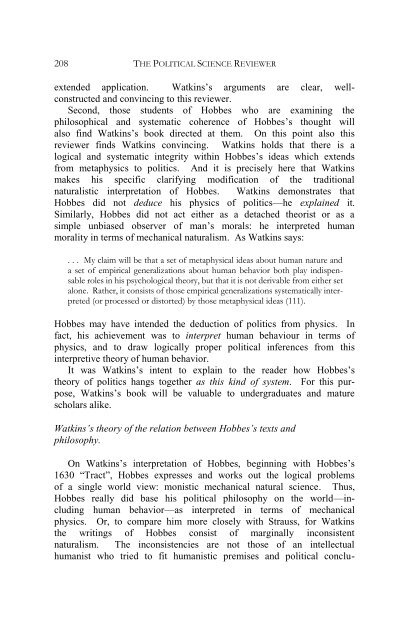Strauss and Watkins on Hobbes' Political Philosophy: A Review
Strauss and Watkins on Hobbes' Political Philosophy: A Review
Strauss and Watkins on Hobbes' Political Philosophy: A Review
Create successful ePaper yourself
Turn your PDF publications into a flip-book with our unique Google optimized e-Paper software.
208 THE POLITICAL SCIENCE REVIEWER<br />
extended applicati<strong>on</strong>. <str<strong>on</strong>g>Watkins</str<strong>on</strong>g>’s arguments are clear, well-<br />
c<strong>on</strong>structed <str<strong>on</strong>g>and</str<strong>on</strong>g> c<strong>on</strong>vincing to this reviewer.<br />
Sec<strong>on</strong>d, those students of Hobbes who are examining the<br />
philosophical <str<strong>on</strong>g>and</str<strong>on</strong>g> systematic coherence of Hobbes’s thought will<br />
also find <str<strong>on</strong>g>Watkins</str<strong>on</strong>g>’s book directed at them. On this point also this<br />
reviewer finds <str<strong>on</strong>g>Watkins</str<strong>on</strong>g> c<strong>on</strong>vincing. <str<strong>on</strong>g>Watkins</str<strong>on</strong>g> holds that there is a<br />
logical <str<strong>on</strong>g>and</str<strong>on</strong>g> systematic integrity within Hobbes’s ideas which extends<br />
from metaphysics to politics. And it is precisely here that <str<strong>on</strong>g>Watkins</str<strong>on</strong>g><br />
makes his specific clarifying modificati<strong>on</strong> of the traditi<strong>on</strong>al<br />
naturalistic interpretati<strong>on</strong> of Hobbes. <str<strong>on</strong>g>Watkins</str<strong>on</strong>g> dem<strong>on</strong>strates that<br />
Hobbes did not deduce his physics of politics—he explained it.<br />
Similarly, Hobbes did not act either as a detached theorist or as a<br />
simple unbiased observer of man’s morals: he interpreted human<br />
morality in terms of mechanical naturalism. As <str<strong>on</strong>g>Watkins</str<strong>on</strong>g> says:<br />
. . . My claim will be that a set of metaphysical ideas about human nature <str<strong>on</strong>g>and</str<strong>on</strong>g><br />
a set of empirical generalizati<strong>on</strong>s about human behavior both play indispen-<br />
sable roles in his psychological theory, but that it is not derivable from either set<br />
al<strong>on</strong>e. Rather, it c<strong>on</strong>sists of those empirical generalizati<strong>on</strong>s systematically inter-<br />
preted (or processed or distorted) by those metaphysical ideas (111).<br />
Hobbes may have intended the deducti<strong>on</strong> of politics from physics. In<br />
fact, his achievement was to interpret human behaviour in terms of<br />
physics, <str<strong>on</strong>g>and</str<strong>on</strong>g> to draw logically proper political inferences from this<br />
interpretive theory of human behavior.<br />
It was <str<strong>on</strong>g>Watkins</str<strong>on</strong>g>’s intent to explain to the reader how Hobbes’s<br />
theory of politics hangs together as this kind of system. For this pur-<br />
pose, <str<strong>on</strong>g>Watkins</str<strong>on</strong>g>’s book will be valuable to undergraduates <str<strong>on</strong>g>and</str<strong>on</strong>g> mature<br />
scholars alike.<br />
<str<strong>on</strong>g>Watkins</str<strong>on</strong>g>’s theory of the relati<strong>on</strong> between Hobbes’s texts <str<strong>on</strong>g>and</str<strong>on</strong>g><br />
philosophy.<br />
On <str<strong>on</strong>g>Watkins</str<strong>on</strong>g>’s interpretati<strong>on</strong> of Hobbes, beginning with Hobbes’s<br />
1630 “Tract”, Hobbes expresses <str<strong>on</strong>g>and</str<strong>on</strong>g> works out the logical problems<br />
of a single world view: m<strong>on</strong>istic mechanical natural science. Thus,<br />
Hobbes really did base his political philosophy <strong>on</strong> the world—in-<br />
cluding human behavior—as interpreted in terms of mechanical<br />
physics. Or, to compare him more closely with <str<strong>on</strong>g>Strauss</str<strong>on</strong>g>, for <str<strong>on</strong>g>Watkins</str<strong>on</strong>g><br />
the writings of Hobbes c<strong>on</strong>sist of marginally inc<strong>on</strong>sistent<br />
naturalism. The inc<strong>on</strong>sistencies are not those of an intellectual<br />
humanist who tried to fit humanistic premises <str<strong>on</strong>g>and</str<strong>on</strong>g> political c<strong>on</strong>clu-
















